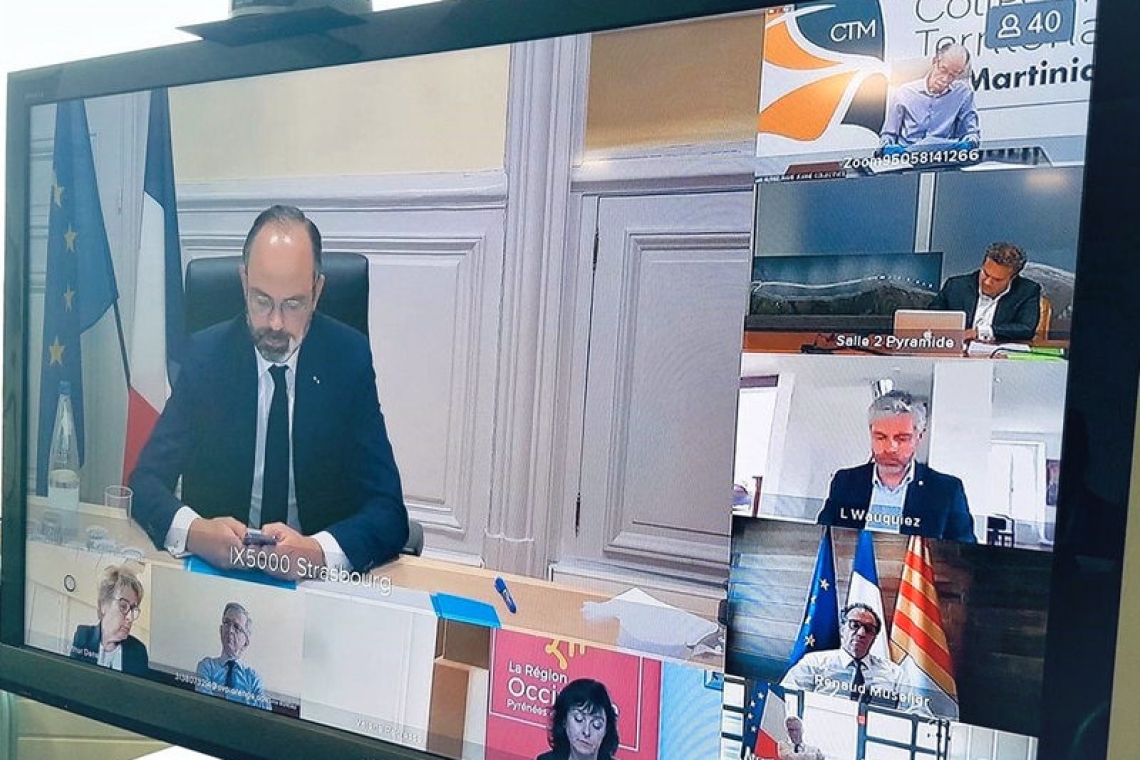Virtual conference with Prime Minister Édouard Philippe in progress.
MARIGOT--Revising the Convergence Contract, extending the 2017 Collectivité/State protocol for three years, the five-million euro relief fund for businesses, and the need to obtain tax revenues from the State are key measures that will stimulate St. Martin’s recovery, President Daniel Gibbs told French Prime Minister Édouard Philippe on Thursday during a virtual meeting.
The virtual conference included the participation of Ministers Jacqueline Gourault, Bruno Lemaire, Gerald Darmanin, Jean-Michel Blanquer, Sébastien Lecornu and the Presidents of the Regions. The theme of the conference was the exit strategy from confinement and the Solidarity Fund.
Gibbs explained the decision of the Collectivité of St. Martin to supplement the State’s Solidarity Fund with the release of an exceptional five-million-euro fund to support St. Martin companies. This fund will be distributed in three instalments in the form of zero-interest loans with deferred repayment, set up with the Collectivite’s institutional partners.
These measures will soon be voted on by the Territorial Council and made available to companies. The eligibility criteria will be similar to those required for the national Solidarity Fund. Gibbs thanked Government’s decision on the latter to extend applications for one month for very small businesses in difficulty and to introduce, as soon as possible, specific measures for tourism- and catering-related businesses which will have to wait longer to restart their activity.
Gibbs informed the Prime Minister of the decision voted by the Territorial Council on April 14 to postpone payments of the turnover tax TGCA, corporation tax and commercial licences, so that businesses can preserve their cash flow.
He reiterated the importance for St. Martin, like the other regions, being able to make full use of the law to ensure there are no obstacles to the payment of national aid to the people of St. Martin.
Gibbs spoke of the need to implement a plan to revive the St. Martin economy by considering a revision of the Convergence Contract with the State. At the same time, the plan will propose to use remaining European funds from the 2014-2020 programmes (26 million euros) to battle the COVID-19 crisis and redeploy part of the funds allocated to cooperation with Dutch St. Maarten (10 million euros) to actions aimed at overcoming this crisis.
He also referred to the need to launch a plan to safeguard the Collectivité’s revenue by revising the amendment to the State/Collectivité protocol signed on November 6, 2017, which runs until the end of 2020. The possibility is there to renew for a further three years (2021-2022-2023).
Ideally, St. Martin would like to be able to obtain from the State, in 2020 and 2021, a guarantee of the tax revenue actually collected in 2019 (100 million euros).
Gibbs said the Collectivité would respond favourably to the possibility offered by the Government at the Inter-Ministerial committee meeting on March 12, 2018, of having a 60-million-euro "Grand Loan" at zero interest (the interest being paid by the State), to speed up the work to rehabilitate the water and sanitation networks, which are essential for health reasons.
Finally, on the question of a relaxing of lockdown, Gibbs reiterated his concern about the re-opening of schools in May, as compliance with health and safety measures must be the top priority for any resumption of classes in St. Martin. He said the Collectivité will not take any risks until the Government has ensured the implementation of satisfactory protection measures for the pupils and the population.
Gibbs reminded Philippe of the island’s unique situation, a bi-national territory shared with St. Maarten, and as such issues of unprecedented importance like COVID-19 have to be shared on both sides while the constant flow of people crossing the border has potentially a serious impact on health.
He said he is open to a de-escalation of confinement and gradual economic recovery only if there has been a serious study to determine whether it is feasible, and if appropriate measures have been taken for sustainable







